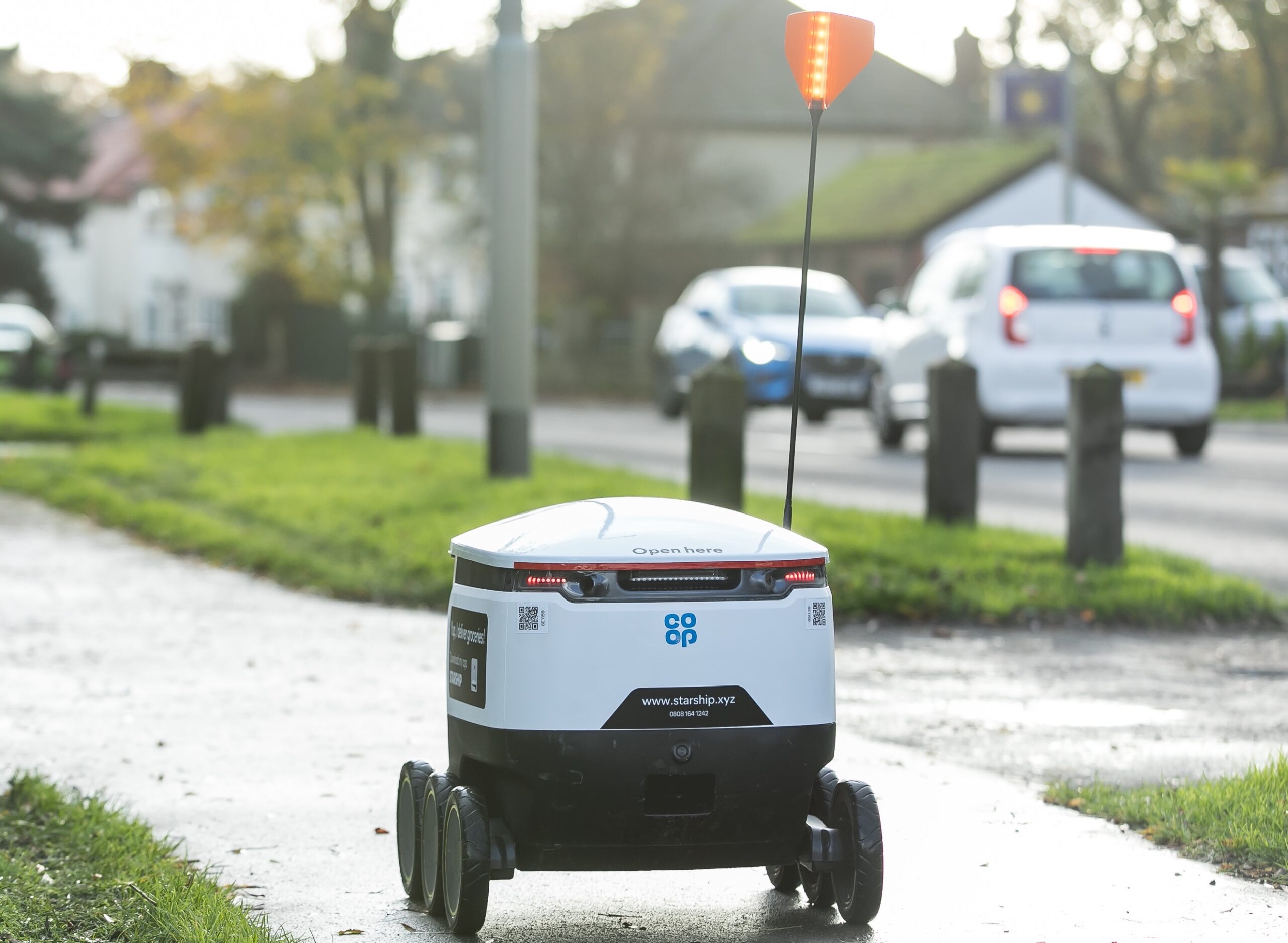DPD has recently confirmed plans to expand autonomous robot deliveries to 10 UK towns and cities. The parcel delivery firm also revealed that it has identified up to 30 depot locations which could potentially deploy these self-driving systems.
This latest robotic roll-out follows a successful trial in Milton Keynes, but DPD isn’t the only company to bring delivery robots to the region. Convenience retailer Co-op first trialled six-wheeled bots there in 2018, in partnership with autonomous vehicle producer Starship Technologies.
The supermarket has since expanded its robotic grocery delivery service to seven locations across England. Orders are picked, fresh, in the local stores, and delivered quickly to consumers. Co-op told DeliveryX that this approach ensures that the bricks-and-mortar store also benefits from online activity.
“Co-op stores are well placed in the heart of local communities to provide quick, easy and convenient home deliveries – whether a full shop or last-minute top-ups,” said Chris Conway, ecommerce director, Co-op.
“We are committed to exploring new and innovative ways to provide flexible options online and increase access to our products and services for our members and customers.”
Accessible to all
Co-op stressed that the robotic delivery service is designed with all of its customers in mind. Not only do shoppers use the service to fit shopping around their busy lives, but research from Starship has also shown that nearly 25% of customers either have, or live with someone that has, an accessibility need.
When the scheme launched in Cambridge in late 2022, Cllr Alex Beckett, chair of Cambridgeshire County Council’s Highways and Transport Committee, said: “The robots will provide assistance to working families and the elderly who struggle to leave their houses to go shopping.
“The pilot gives us a chance to showcase how history and technology can combine throughout the city streets as we become the leading light in the future of personal, eco-robotic delivery services.”
Furthermore, while Starship robots are autonomous, meeting the level 4 standard which requires no human interaction beyond exceptional circumstances to navigate the network of pavements and crossings, remote assistants remain on hand for safety reasons.
Self-driving and sustainable
Convenient, fast and safe delivery will be driving factors for choosing these robotic solutions. But it’s the lightweight and battery-powered design of the robots that could be critical to cleaning up the last mile.
Starship reported that due to its customers using robots to replace car journeys, it has saved almost 1.7 million kg of CO2 emissions from entering the atmosphere: equivalent to a passenger flying by plane for 6,792 hours.
“Autonomous mobility will be a key lever for decarbonisation, as it transforms last mile transportation into a much greener process” added Anjali Jindal Naik, co-founder and COO of Cartken, the supplier of DPD’s delivery droids.
The future of delivery?
While DPD has set its sights on expanding its robotic delivery operations, the parcel firm is also being realistic. Tim Jones, director of marketing, communications & sustainability DPDgroup UK, told Raconteur: “We aren’t going to see huge numbers of delivery robots on every street in the UK. But there are plenty of places where they can operate very successfully – for example, in campus-style locations.
“The key is to think differently about the delivery model and infrastructure. In addition to the traditional delivery depot on the edge of town, we’re looking at much smaller operations within communities, closer to the end customer.”
Establishing where best to introduce this technology will be key to their success. As will regulation and standardisation surrounding autonomous vehicles. This could still be a long way off, but the previously mentioned operations and trials will help to shape it.
Like any developing logistics trend, delivery robots will take time to be rolled out, and evolve further. They also must exist in a wider delivery ecosystem. It is unlikely that these little bots will replace existing delivery models, but why can’t they work alongside e-cargo bikes, electric vans and other last mile solutions.
It is unsurprising that Co-op has not only introduced these self-driving systems but has also partnered with Deliveroo, Just Eat and Uber Eats to ensure 80% of the UK population will have access to Co-op groceries online by the end of this year. Robots may not be the future of delivery, but innovative partnerships might be.







